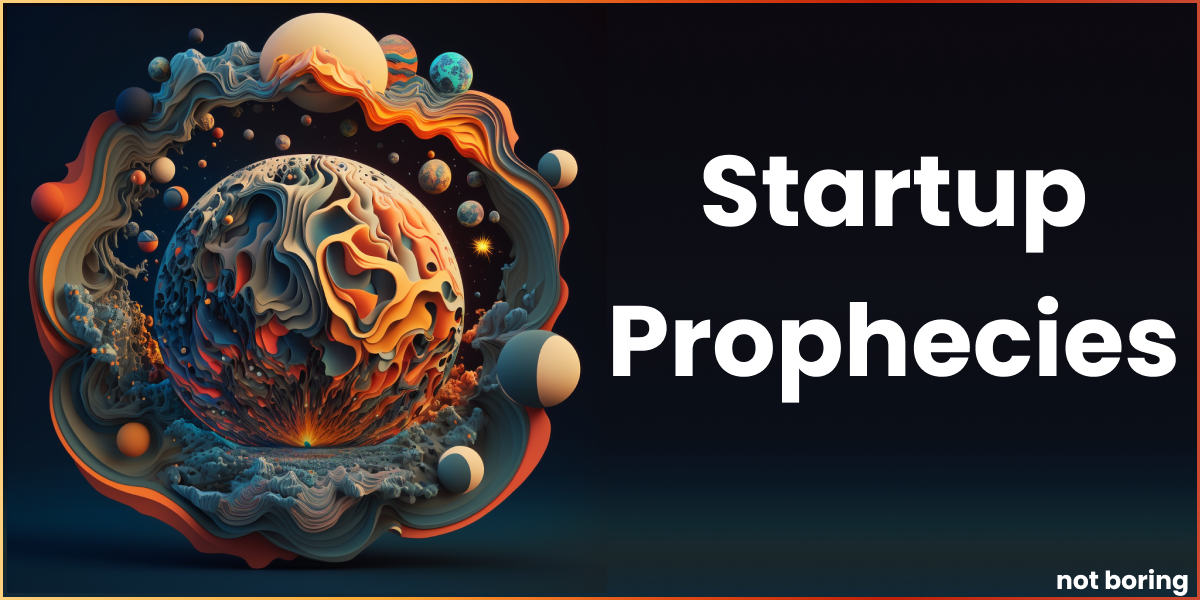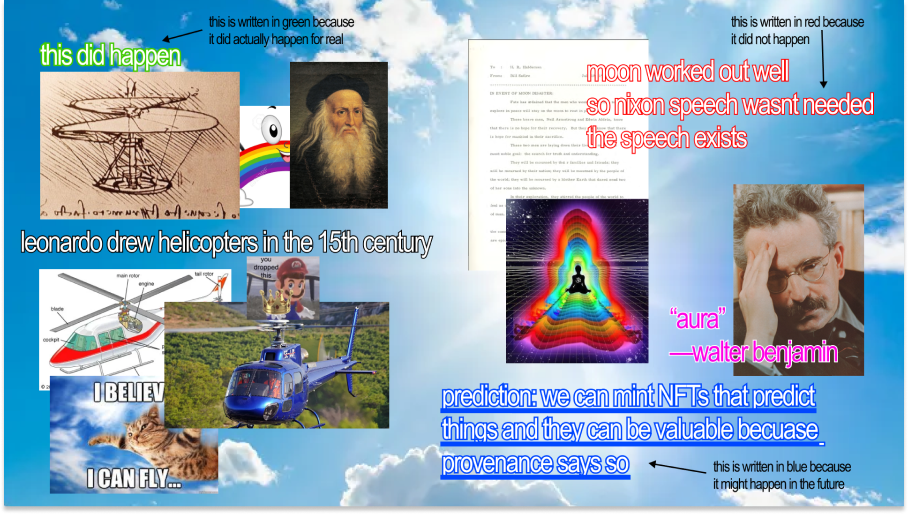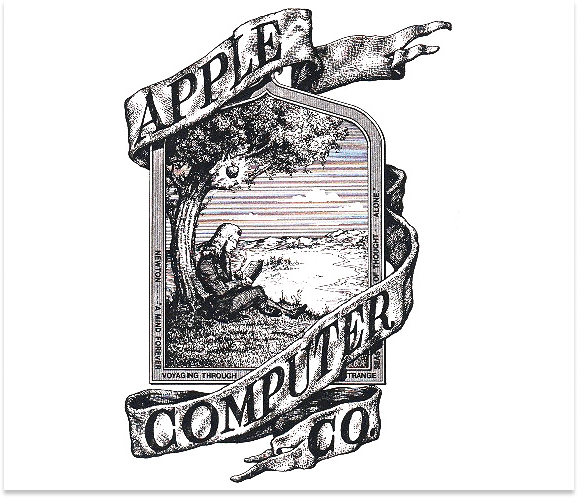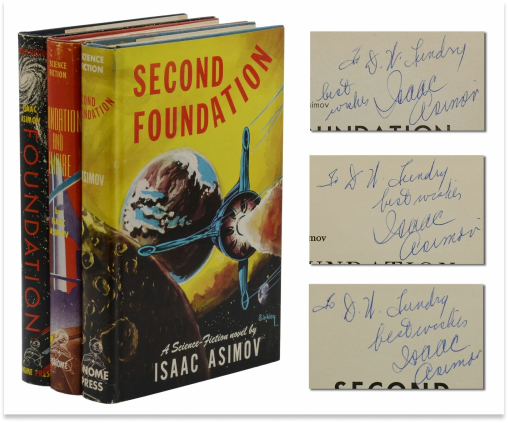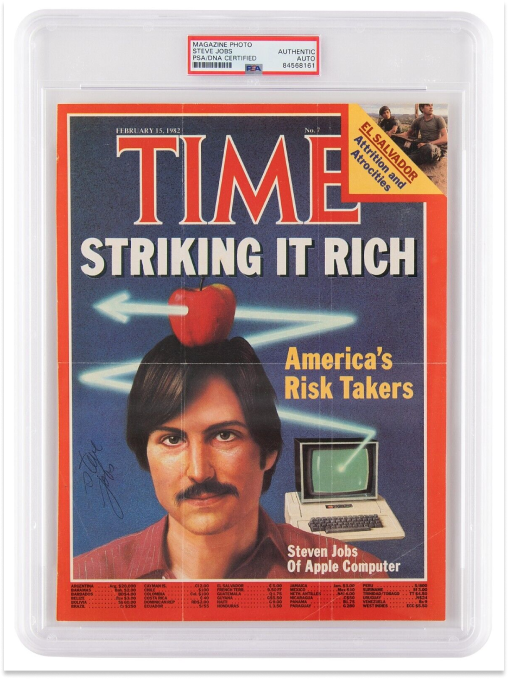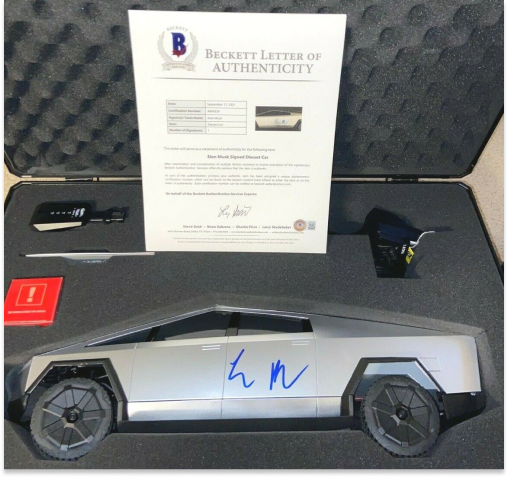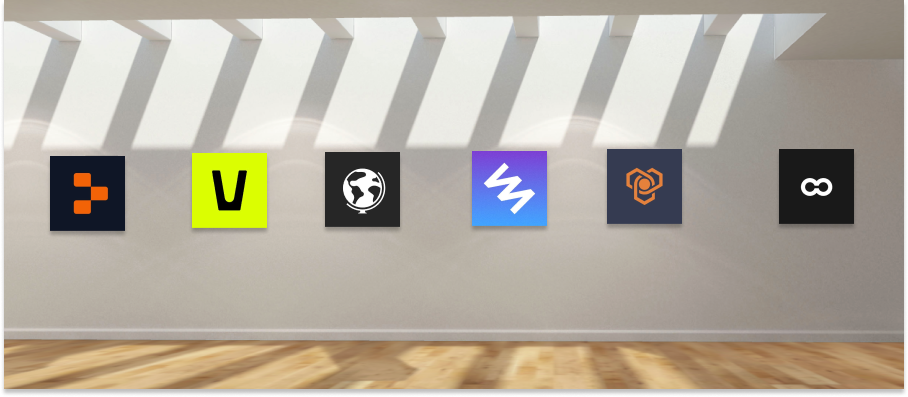Not Boring by Packy McCormick - Startup Prophecies
Welcome to the 746 newly Not Boring people who have joined us since last Tuesday! If you haven’t subscribed, join 184,867 smart, curious folks by subscribing here: Today’s Not Boring is brought to you by… Wander Last week, I wrote about Wander. It’s already one of our most popular deep dives ever. Here’s a quick refresher: Wander is a network of smart vacation homes that come with inspiring views, modern workstations, restful beds, hotel-grade cleaning and 24/7 concierge service –– combining the quality of a luxury hotel with the space and comfort of a vacation home, only better. Don’t take my word for it. Use promo code notboring for $250 off your next trip. (Expires Thursday at 11:59pm ET). Explore now. But that’s only part of the story. Wander recently launched Atlas –– a first-of-its-kind vacation rental REIT that gives you the chance to own a piece of their magical portfolio of homes. With Atlas, accredited investors have the opportunity to earn income and diversify their portfolio without the headache and hassle of buying a property, renting it out, or maintaining it. Plus, right now new Atlas investors may get the chance to invest in Wander’s next round of funding¹. You can learn more on their website: Hi friends 👋, Happy Tuesday! Let’s have a little fun today, shall we? Let’s get to it. Startup PropheciesI have a few core beliefs that animate Not Boring:
I also have a few less-core-but-relevant-here beliefs, which I’ve written about:
In Story Time, I wrote that “In a world of abundance, attention is the scarcest resource, and people’s attention is hard to earn.” I suggested that startups should shift from top-down storytelling to bottoms-up narrative building, in partnership with their fans and communities, and that they could take lessons from NFT projects, which create worlds and then largely turn narrative-building over to the people who own the NFTs. The connection between NFTs and startups in Story Time was loose, just a source of inspiration for the progressive decentralization of narrative. I wasn’t suggesting that startups should actually create NFTs or encourage their fans to do the same. Then, in October, I read Jacob Horne’s Prophecy Markets, and my brain blew up. Horne proposed a structure for positive sum prediction markets in which anyone can make a prediction, mint the prediction as an NFT, and let it trade freely. If a bold prediction paired with beautiful art comes true, might that NFT be worth more than it was when it was created? What other benefits come from giving people shared ownership in the prediction? Horne asks:
In the spirit of cc0, I’ve been remixing this idea in my head ever since I read the piece four months ago, and can’t stop thinking about how beautifully it applies to startups. Swirl all of that together, and here’s the idea: Startup Prophecy Markets. Startup Prophecy Markets let anyone timestamp predictions about the startups they believe in most by creating art, videos, stories, analysis, and more about the companies’ futures and minting them. Theoretically, if the predictions are bold enough, the content is good enough, and the startups they’re attached to are ambitious enough, those NFTs might be worth more in the future than they are today. A quick scan of eBay reveals a booming market for early memorabilia from today’s great tech companies. Even more interestingly, what does it mean to create a rich positive sum ecosystem around startups? Do more people start working together to help them succeed? Do NFTs associated with startups tackling the most important problems become more than those associated with startups that merely become valuable? Does it encourage founders to make bolder bets, and provide them with an army of supporters when they do? That’s what we’ll explore today. To start, let’s dive into the details of Prophecy Markets. Prophecy MarketsProphecy Markets. brainwormed me like nothing I’ve read in a while. The core idea in Horne’s October essay is that it might be possible to create positive sum prediction markets by using NFTs to capture “equity in a moment.” Traditional prediction markets are zero sum. A prediction market ends in a binary outcome - $0 or $1. Right now on Kalshi, you can go long Everything Everywhere All at Once winning Best Picture at the 2023 Oscars for $0.70. If it wins, you get back $1. If it loses, you get nothing. Equities, on the other hand, are positive sum. You don’t need someone to take the other side to invest in a startup, for example, and the upside is uncapped. Sequoia made $3 billion from its $60 million investment in WhatsApp. Accel’s 15% Series A stake in Thefacebook was worth roughly $9 billion when Facebook IPO’d in 2012. Masa Son’s $20 million investment in Alibaba was worth an eye-popping $60 billion when the Chinese ecommerce giant went public in 2014. No one lost money when those companies succeeded (although the outcomes must have been painful for investors who passed), but early believers were rewarded enormously. Of course, many venture investments go to $0; the difference is that they’re not capped when they succeed. What would it look like to design prediction markets that behave more like equities? Horne proposes minting predictions as NFTs. But he starts the thought exercise crypto-free. He gives an example of an artist who predicts that an alien spacecraft will visit humanity for the first time on December 1, 2025 by hovering over the Eiffel Tower. The artist paints 10 pictures of the spacecraft floating above the Eiffel Tower, asks a journalist to timestamp in print, sells two copies for $100 each (one to the journalist and one to an amused reader), and locks the rest in storage.
Lo and behold, against all odds, on December 1, 2025, there it is: an alien spacecraft hovering over the Eiffel Tower. What would those original paintings be worth?
“NFTs?!” you might be asking yourself. “Aren’t those dead? JPow gets a little dovish and we’re back to talking about NFTs?” Horne anticipates your pushback (emphasis mine):
The Official Not Boring Take™️ on NFTs has always been that they’re an incredibly useful primitive that will get more useful with time. As I wrote in Web3 Use Cases: Today:
Even now, the NFT market is coming back to life, seen more clearly in the number of trades than in the dollar volume: And it’s evolving. Checks by Jack Butcher is one of the most fun projects I’ve seen in a while. Visible is using NFTs as digital titles to homes. DIMO is using NFTs to store your car’s data. And Prophecy Markets feels like a truly native and novel structure that could only exist in its fullness with NFTs. Prophecy Markets is one of those “start out looking like a toy” ideas that could become really powerful. It takes advantage of all of the things that NFTs are uniquely good at to create a new market structure designed for a world of abundance. After I read it, I became more convinced that NFTs are going to become an increasingly important piece of our digital lives. Because the real value isn’t in the price of the predictions, but in the rich worlds that can develop around them. What would happen to the startup ecosystem if we introduced Startup Prophecies? Startup PropheciesStartup Prophecies are a derivative of Prophecy Markets that let anyone permissionlessly create and mint predictions, art, analysis, code, videos, stories, and more around startups. These Startup Prophecy NFTs can be traded, creating a 3D market on top of the more linear venture funding market. The thing that excites me about this idea is that, unlike alien landings, people can actually influence startup outcomes. They can tell stories, spread awareness, call their Senators, make customer introductions, and build a richer world around the missions they believe in. This is decentralized storytelling or web3 media that is company-centric but not company-directed:  What does Web3 media look like?
Community-centric, not company-centric.
A group of people organized around a common cause, which creates content that advances that cause. Here’s how it works, at its most basic:
I don’t think that the value of the assets will tightly track the value of companies, and I don’t think that there will be a market for every company’s NFTs. Companies can become valuable without becoming important, and my guess is that NFTs associated with the ones that become important will be worth more than those for the ones that simply become valuable. Which, in my opinion, is a feature. Startup Prophecy NFTs are not shares in the company. They’re loosely connected not by legal documents, but by memes. People will naturally be more attracted to the stories attached to companies that can take us to Mars, cure cancer, or birth AGI – Hard Startups that do new and important things – than they are to those about yet another CRM or an iterative workflow product. Startup Prophecies will reward Good Quests. A few hypothetical historical examples might paint the picture. Imagine that a digital artist created an image of a SpaceX rocketship landing on Mars in 2040 way back in 2003, when the company was founded, minted ten of them, and sold them for $100. It’s hard to imagine those wouldn’t be worth more than $100 today, and harder to imagine they wouldn’t be much more valuable if SpaceX actually lands on Mars in 2040. Imagine that way back in 1976, Apple minted 100 editions of its original logo and gave them to its first 100 customers. Those would be worth something today. Imagine that a sci-fi writer wrote an optimistic short story about a world in which OpenAI figures out AGI when the company launched in 2015, minted it, and sold 1,000 copies at a market clearing price. The proceeds might have allowed her to keep writing full-time. NFTs of the short stories would likely have increased in value with each breakthrough the company made over the past few years, and exploded with the launch of ChatGPT. They’d probably be worth even more if OpenAI ultimately achieves its mission. Forget the NFT piece for a second. As you read this, there are multiple first edition Isaac Asimov books for auction on eBay at over $1,000, with a signed First Edition Trilogy as high as $32,000. There are dozens of old school Apple t-shirts on offer for hundreds of dollars, and this signed Steve Jobs Time Magazine cover is up for $124,995. Maybe a CyberTruck Hot Wheels signed by Elon Musk himself is more your speed? Good news. It can be yours for only $49,999.99 (or Best Offer). By contrast, the most expensive Salesforce t-shirt on offer is $39.99 and there’s practically no market for TikTok company swag despite the product’s popularity, adding credence to the idea that Startup Prophecies related to companies that become both important and valuable will be worth more than those related to companies that merely become valuable. Of course, one way to bet on the success of a younger company like Stripe or Replit or OpenAI would be to find something autographed by Patrick Collison or Amjad Masad or Sam Altman, put it in a protective case, and wait. And given that we’ve focused on the monetary value of the hypothetical NFTs or real collectibles thus far, I wouldn’t blame you for going that route. But the value of the assets is probably the least interesting piece of the Startup Prophecies idea. The greater benefits would come in the form of the impact on the companies, the NFTs’ creators, their holders, and the communities and products that form on top of them. To understand what those might be, it’s helpful to go into the attributes that make NFTs uniquely suited for this purpose. Why NFTs?
That last piece – composability – is especially important. Key to Startup Prophecies is the fact that anyone can build experiences for NFT holders. In the simplest form, that might mean access to a company’s community-run Fan Club Discord. The companies themselves may choose to give holders tokengated access to events, discounts, or limited edition swag. People can show off their NFTs passively in their wallets or actively in galleries like OnCyber and build up a richer picture of themselves online. Creators can create derivative works to expand and reinforce the ecosystem, as is happening with Checks and Nouns. DAOs can form to coordinate holders’ activities and provide grants to projects that support the company (see this grant-funded Nouns video). Developers could build apps – as simple as Startup Prophecy-specific NFT marketplaces or as rich as games and virtual worlds – that incorporate the NFTs. All of this can be done bottoms-up, without any involvement from the companies themselves. It’s already happening with digital art. By creating a new layer, Startup Prophecies adds a whole new dimension to the startup ecosystem and turns supporting companies into a big, open game. The fun thing about open, permissionless systems is that they’ll evolve and grow in unpredictable ways. I can’t know all of the different ways that people might run with the idea, but there are a few categories of things I can see happening that have little to do with the price of the NFTs themselves. Here are a few. Broaden the Community of Supporters Would Startup Prophecies broaden the community of supporters around the most ambitious companies? Would artists and videographers and writers find rich new source material in companies aligned with their beliefs? Would companies themselves create tokengated experiences for people who hold their NFTs? Would fan clubs spring up? Might a DAO of NFT holders even take a board seat one day? Anchor NFTs to “Real World Assets” Without Legal Hoops Would conceptually tying NFTs to real companies create a 3D side-market on those companies’ performance? Would company-related NFTs be more valuable than a random NFT project by association with something real and important? Could Startup Prophecies be an informal, web3-native bridge between traditional and crypto markets without the legal headaches? Would Startup Prophecy NFTs provide a crowdsourced way to assess the value and cultural relevance of companies in between funding rounds? Showcase Missions You Believe In Just like art collectors hang their pieces in galleries, Punk owners use their Punks as PFPs, or angel investors list their best companies in their Twitter bios, might people create wallets and galleries filled with NFTs related to companies and missions they believe in? Would the ability to show support for space exploration or cell therapies expand the universe of people who hold digital assets? Would community members with expertise curate the most exciting companies working in Climate, Biotech, Space, web3, and a number of different categories? What would the internet look like if people could more easily show what they’re for than shout what they’re against? Build a Fantasy Startup Portfolio Might aspiring VCs use timestamped collections of Startup Prophecies to build up a track record? Could a company build a Startup Prophecy Fantasy App to rank collectors across a number of metrics and give visibility to people who might not otherwise get noticed by top funds or be able to launch their own? Would the popularity of certain NFTs even inform VCs’ decisions about which companies to invest in? Encourage Optimistic Visions of the Future If there were a market for Startup Prophecies, would more people use their skills – as artists, writers, videographers, musicians, analysts – to create more optimistic visions of the future? What would the world look like if the incentives for expressing optimism on the internet outweighed those for expressing pessimism? Might the market’s desire to own assets that represent grand but possible futures push creators towards definite optimism and sharp analysis instead of pie-in-the-sky guesses? Incentivize Good Quests If my intuition that NFTs related to companies that become valuable and important will be worth more than companies that simply become valuable, will the existence of Startup Prophecies create incentives for more people to Choose Good Quests? Would the knowledge that free marketing and support will exist for the most ambitious companies tackling the biggest challenges tip skilled founders towards doing something harder than they otherwise might have? Would that same knowledge give investors more confidence to back those Hard Startups? Would iterative or copycat ideas fall out of favor? Accelerate Positive Outcomes Most importantly, could a positive sum market of Startup Prophecies be self-fulfilling? “Do more people start working together to make something a reality?” If they do, would it tip the scales enough that a bold company might succeed where they otherwise might have failed? Would ownership and community involvement provide enough activation energy to turn people into advocates? I framed all of these as open questions because I have no idea how it might play out. It’s very possible that the vast majority of Startup Prophecy NFTs don’t find an audience and fizzle into obscurity. Some might attract buyers for a while, but fade after the predicted event even if it comes to pass. Interest in projects might wane between funding rounds or big announcements, creating falsely volatile swings. This being the internet, there might very well be a market for negative predictions about companies, and the associated efforts to bring those to life. There’s a good chance that the value of the NFTs never quite connects with the value of the companies they represent. There’s no way to predict how a complex, dynamic market like this would evolve, or that it would even take off in the first place. But I think there’s something magical here. Instead of trying to shoe-horn everything into becoming a Crypto Thing, it lets the core asset (in this case, a startup, but it could be a movie, or a team, or a game, or whatever) focus on what it does best while a loosely-tethered community of loosely-incentivized supporters forms around it. If nothing else, it’s a new form of company merch and memorabilia. There’s only one way to find out. I want to experiment with this idea. The easiest way would be to mint deep dives I’ve written about companies, and I might do that, but there are more native ways to do it. I want to write optimistic short stories about the world in which they succeed. I … just need to learn how to write short stories first, so I’m timestamping the idea here in the meantime. If this idea takes off, I want Not Boring Capital’s Portfolio page to be an OnCyber gallery full of the NFTs related to the companies we’ve invested in. For now, I’ll start by minting this post on Mirror. If this version of events comes to be, if a rich ecosystem of Startup Prophecies develops, maybe this post will be worth something one day. Who knows. The point here isn’t to make money now – I’ll donate the proceeds to charity – but to watch what happens when more people are aligned behind missions they believe in and the people bringing those missions to life. Let’s see what happens. P.S. Startup Prophecies is just one riff on Prophecy Markets. There are many riffs left to explore. 👀 Thanks to Dan, Jacob, and Puja for your feedback! That’s all for today! We’ll be in your podcast feeds this week and in your inbox with a Weekly Dose on Friday. Thanks for reading, Packy 1 Wander hopes to provide certain investors in Atlas the opportunity to invest in a future Wander financing round. Notwithstanding the foregoing, neither Wander nor Atlas can guarantee any Atlas investor will be provided such opportunity. Wander reserves the right to deny, in its sole discretion, any and all Atlas investors the opportunity to participate in any future financing rounds. Wander’s ability to allow investors to participate in future financing rounds depends on a number of factors, including, but not limited to, the terms of the financing round and applicable securities laws and regulations. Before participating in any future Wander financing rounds, each prospective Wander investor will have to qualify for the offering under applicable securities laws and will be required to provide supporting documentation to verify their qualifications at the time of the offering. Not Boring by Packy McCormick is free today. But if you enjoyed this post, you can tell Not Boring by Packy McCormick that their writing is valuable by pledging a future subscription. You won't be charged unless they enable payments. |
Older messages
Weekly Dose of Optimism #28
Friday, February 3, 2023
Innovative Immigrants, nEKo, Life Improvements, Elon Bannister, 3D Rocket Parts
Wander: Owning Happy Places
Tuesday, January 31, 2023
Wander Atlas & Natively Integrated Luxury Vacation Rentals
Weekly Dose of Optimism #27
Friday, January 27, 2023
Atomic AI, Blueprint, GLP-1s, Hydrogen Aviation, Biden's America, and DIMO
Atomic AI: Unlocking RNA
Wednesday, January 25, 2023
Why we invested in Atomic AI
Weekly Dose of Optimism #26
Friday, January 20, 2023
RSV Vaccine, Obesity and Diet, Solar Plunge, Rise of Steel, Recession Startups, OFP on NBF
You Might Also Like
Lessons learned from growing 265k LinkedIn newsletters subscribers
Thursday, February 27, 2025
It's the perfect adaptation to shifts in B2B marketing Think about these disruptions over the past 5 years in digital… ⚠️ Blog comments are dead ⚠️ Readers are evermore skeptical to subscribe ⚠️
🎙️ New Episode of The Dime Ecosystem Secrets: How Premier Cannabis Brands Scale ft. Nate D
Thursday, February 27, 2025
Listen here 🎙️ Ecosystem Secrets: How Premier Cannabis Brands Scale ft. Nate D Consumer buy brands. And in cannabis, California brands reign supreme because they uphold the most sacred element in
Why people buy from your competitors (and how to stop it)
Thursday, February 27, 2025
What makes people choose a competitor over your brand? It's not just the price tag. In fact, 42% of consumers would pay more for a positive experience, according to PwC. Plus, positive experiences
The 2025 SaaS Vibe Check
Thursday, February 27, 2025
What Founders Need to Know Right Now To view this email as a web page, click here saastr daily newsletter The 2025 SaaS Vibe Check: What Founders Need to Know Right Now with SaaStr CEO and Founder
Who is Larry Ellison?
Thursday, February 27, 2025
Anton Troynikov's Guest Post on the "CEO of Everything" ͏ ͏ ͏ ͏ ͏ ͏ ͏ ͏ ͏ ͏ ͏ ͏ ͏ ͏ ͏ ͏ ͏ ͏ ͏ ͏ ͏ ͏ ͏ ͏ ͏ ͏ ͏ ͏ ͏ ͏ ͏ ͏ ͏ ͏ ͏ ͏ ͏ ͏ ͏ ͏ ͏ ͏ ͏ ͏ ͏ ͏ ͏ ͏ ͏ ͏ ͏ ͏ ͏ ͏ ͏ ͏ ͏ ͏ ͏ ͏ ͏ ͏ ͏ ͏ ͏ ͏
Longevity startup nears $2.5B valuation
Thursday, February 27, 2025
AI stretches robotics VC beyond hardware; big rounds keep foodtech afloat; Nvidia-backed Lambda banks $480M Read online | Don't want to receive these emails? Manage your subscription. Log in The
🎮 Microsoft’s AI is here!
Thursday, February 27, 2025
Now we get to say goodbye to coding!!
The 4 non-negotiables of a good lead
Thursday, February 27, 2025
Use these four tips to qualify new leads ͏ ͏ ͏ ͏ ͏ ͏ ͏ ͏ ͏ ͏ ͏ ͏ ͏ ͏ ͏ ͏ ͏ ͏ ͏ ͏ ͏ ͏ ͏ ͏ ͏ ͏ ͏ ͏ ͏ ͏ ͏ ͏ ͏ ͏ ͏ ͏ ͏ ͏ ͏ ͏ ͏ ͏ ͏ ͏ ͏ ͏ ͏ ͏ ͏ ͏ ͏ ͏ ͏
Tomorrow: Final chance to enter the Digiday Streaming and Video Awards
Thursday, February 27, 2025
Complete your entries by 11:59 pm PT to be considered
Can The US Eliminate Federal Income Tax?
Thursday, February 27, 2025
Listen now (2 mins) | To investors, ͏ ͏ ͏ ͏ ͏ ͏ ͏ ͏ ͏ ͏ ͏ ͏ ͏ ͏ ͏ ͏ ͏ ͏ ͏ ͏ ͏ ͏ ͏ ͏ ͏ ͏ ͏ ͏ ͏ ͏ ͏ ͏ ͏ ͏ ͏ ͏ ͏ ͏ ͏ ͏ ͏ ͏ ͏ ͏ ͏ ͏ ͏ ͏ ͏ ͏ ͏ ͏ ͏ ͏ ͏ ͏ ͏ ͏ ͏ ͏ ͏ ͏ ͏ ͏ ͏ ͏ ͏ ͏ ͏ ͏ ͏ ͏ ͏ ͏ ͏ ͏ ͏ ͏ ͏ ͏ ͏ ͏ ͏

